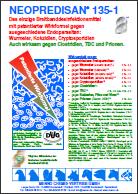NEOPREDISAN 135-1
Why endoparasitecontrol?
Endoparasites, like roundworms (ascaris suum, heterakis, etc.) coccidia (isospora suis, eimeria tenella, cryptosporidia, etc..) infect internal organs and are prone to cause considerable economic loss in animal keeping, as they can lead to poor feed conversion, diarrhoea, reduced weight gains and may even lead to loss of animals.
Most endoparasites are following a direct development-cycle. Infected animals pass worm-eggs or coccidia-oocysts with their manure, these are infectious for other present animals, if taken in.
Treating infected animals with dewormers or coccidiostatics gives only temporary relief, as only adult stages are destroyed within the animal. This is not sufficient!

In case of Coccidiosis, like isospora suis (piglets diarrhoea) or cryptosporidiosis (diarrhoea of calves), medication as well as disinfection of the surroundings of the infected animals become necessary. This means, surfaces in partially occupied stables and barns must be disinfected.
In poultry-fattening operations, eimeria tenella oozysts can be efficiently eradicated by means of disinfection.
Without effective disinfection, excreted endoparasites (prevailing forms, i.e. eggs, oozysts...) can remain on surfaces, surviving for months, even years, still potentially infectuous for animals.
NEOPREDISAN 135-1 is the specific product for disinfection against excreted endo-parasits:
- Pathogen cause of liver milkspots / roundworm eggs (ascaris suum)*
- Pathogen cause of blackhead disease / appendix-worm eggs (heterakis)
- Pathogen cause of piglet’s diarrhoea / coccidia oocyst (isospora suis)
- Pathogen cause of calve’s diarrhoea / coccidia oocyst (cryptosporidien)
- Pathogen cause of coccidiosis in poultry /coccidia oocyst (eimeria tenella)*
- Pathogen cause of trichuriasis / whipwormeggs eggs (trichuris muris)
- Pathogen cause of oxyuriasis / pinworm eggs (aspiculuris tatraptera)

